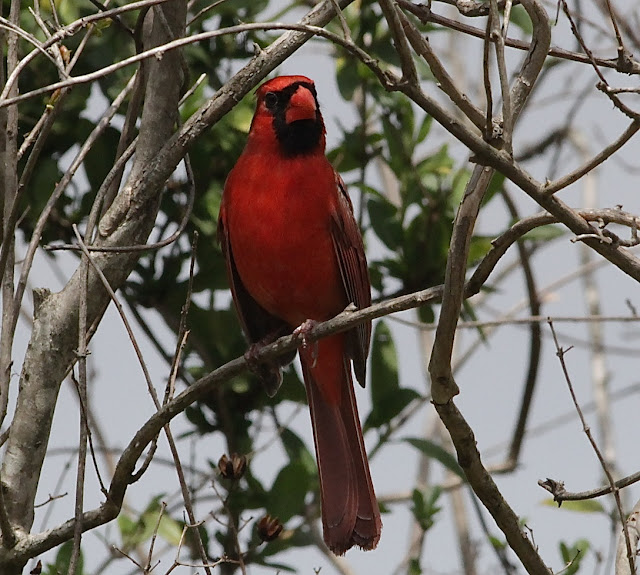This week in birds - #527
A roundup of the week's news of birds and the environment:
Everybody's favorite backyard bird - the Northern Cardinal.*~*~*~*
Indonesia, one of the world's largest consumers of coal, a major pollutant, has agreed to sharply reduce its use of the fossil fuel in response to what is essentially a $20 billion bribe from developed nations.
*~*~*~*
We may still have more than our share of deniers in this country but in other parts of the world, people are well aware of the changing climate and freely acknowledge it.
*~*~*~*
Four dams on the Klamath River will be destroyed to improve the habitat for native salmon. It is the largest dam removal project in U.S. history.
*~*~*~*
How can we prevent the extinction of amphibian species in a changing climate?
*~*~*~*
A new study has found that weather disasters of one kind or another have occurred in at least 90% of the counties in this country within the last eleven years.
*~*~*~*
The dainty little Piping Plover is the American Bird Conservancy's Bird of the Week. The good news about the plover is that its numbers are increasing.*~*~*~*
It hardly seems possible that a great river like the Amazon could dry up, but in fact, the river is in trouble.
*~*~*~*
The world's melting glaciers are releasing a vast mass of microbes some of which may be harmful to life on the planet.
*~*~*~*
Another potential for harm to life is deforestation which pushes bats into closer proximity to humans and horses making a crossover of virus a more likely event.
*~*~*~*
Boreal forests are the world's largest intact forest ecosystem and one of the biggest stores of carbon. Canada is seeking the help of Indigenous communities to aid in fighting climate change by managing the forest and keeping the carbon where it is.
*~*~*~*
An examination of fish fossils has shown that humans were cooking their fish dinners at least 780,000 years ago. That's much earlier than had previously been believed.
*~*~*~*
The National Park Service is studying the feasibility of reintroducing the grizzly bear to the Cascades in Washington state where they formerly roamed.
*~*~*~*
The National Butterfly Center in Mission, Texas has had to endure harassment from right-wing extremists in recent years, but it has persevered and is making a comeback.
*~*~*~*
It seems that chimpanzees enjoy showing off their finds to other chimpanzees.
*~*~*~*
There are about 2.5 million ants for every human on Earth. In a very real sense, one could say that ants rule the planet.
*~*~*~*
Extreme heat will change us and change the way will live. It is already having an effect.
*~*~*~*
Coral reefs of the world have already suffered catastrophic losses because of the effects of climate change.
*~*~*~*
A glorious palette of autumn leaf colors at the New York Botanical Garden. And what happens to all those leaves that fall?


Good morning, Dorothy: Thank you for the weekly roundup; my guaranteed signal that it is Saturday morning. I had hoped that with COP 27 taking place in Egypt this week we would be treated to a multitude of grand plans to begin to heal the Earth but we are still limping along, making vague promises, most of which will not be met, and without the tools for ensuring compliance, and one may say with confidence, "Plus ça change, plus c'est la même chose." The fossil fuel industry mounted a huge presence to lobby against change. Kind of like inviting bank robbers into the vaults. Ah well, we are now eight billion people and moving upwards. We may challenge those ants yet!
ReplyDeleteOne of the biggest surprises to me is how much people in other parts of the world love our Northern Cardinal. It's so common here that I tend to take them for granted.
ReplyDeleteThe National Butterfly Center is a place I'd like to visit. It's sad that it has been the target of so much hate. Very sad.
We had the chance to visit the center several years ago. It's an unprepossessing site and, it would seem, a most unlikely target of the haters but there is no accounting for their twisted minds.
DeleteI was pleased to read that the National Butterfly Center is making a comeback.
ReplyDeleteI'm reading a very good mystery right now (Elly Griffiths' latest), and although it's fiction, I'm sure there's many grains of truth in this one scenario in which a Member of Parliament believes in climate change yet is being paid well to deny that there is such a thing. I would imagine that that little practice is alive and well over here, too, since so many politicians who get elected seem to do so in order to fatten their bank accounts, not to serve the people who elected them.
Her book is on my TBR list.
DeleteI would love to see a Northern Cardinal one day. But they don't come out west.
ReplyDeleteThey are wonderful birds and we are fortunate to have them. Their cousin, the Pyrrhuloxia, inhabits some parts of the West, but I don't know it that extends to where you live.
DeleteSo yes, we need to do everything we can to stop climate change. It is going to be the death of our planet and life as future generations know it. But I am not entirely unhappy that this ancient city has been found on the Tigris. I live for these kinds of discoveries!!
ReplyDeleteIt is an ill wind indeed that blows no good. Perhaps we can count such discoveries on the positive side of climate change.
Delete